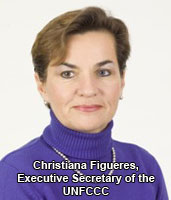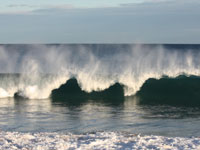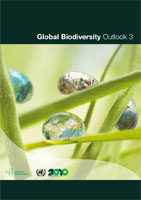
News |
- Few Pipeline Recommendations Approved
- First Nations Water Bill Tabled
- Christiana Figueres Appointed to UNFCCC Post
- World Oceans Day: June 8th
- Cape Cod Wind Project Green Light
- Living Proof
- Atlantic Garbage Patch
- Calls for Offshore Oil Drilling Halt & Study
- Manitoba Proposes New Parks
- Canadian Provinces Score No Better Than C+
- 2010 Goldman Prizes Awarded
- U.N. Says World Failing to Protect Biodiversity
| Few Pipeline Recommendations Approved | 11 June 10 |
 Canada's federal government and the Northwest Territories (NWT) government have accepted only 10 of the 115 recommendations made by the federal environmental panel regarding the proposed Mackenzie Valley pipeline. Canada's federal government and the Northwest Territories (NWT) government have accepted only 10 of the 115 recommendations made by the federal environmental panel regarding the proposed Mackenzie Valley pipeline.The Joint Review Panel under the Canadian Enviromental Assessment Act made a total of 176 recommendations to mitigate any harmful environmental and socio-economic effects of building and operating a 1,200-kilometre natural gas pipeline. Of those recommendations, 115 were aimed at Canada's federal and N.W.T. governments. When the panel released its findings December 2009, it said they would only support the proposed pipeline if all its recommendations were implemented. But in an interim response, the Canadian and N.W.T. governments stated only 10 Joint Review Panel recommendations would be accepted as written. Twenty-eight recommendation were rejected outright and 77 were acceptable with changes. The governments did not identify which recommendations were accepted, rejected or needed modification; Their response did point to general concerns that some recommendations might constrain development, require long-term government funding commitments, and have timelines the governments cannot follow. The National Energy Board, a federal agency that regulates parts of Canada's energy sector, is determining whether to approve the pipeline proposal. The board's decision is expected September 2010. The pipeline also requires an environmental licence and many work permits. View May 17, 2010 CBC articleVisit Joint Review Panel for the Mackenzie Gas Project Website Visit Public Registry for the Review of the Mackenzie Gas Project View Report of the Joint Review Panel for the Mackenzie Gas Project View May 17, 2010 Government of Canada news release View Government of Canada & The Northwest Territories Interim Response to The Joint Review Panel Report for the Proposed Mackenzie Gas Project Visit Mackenzie Gas Project website Source: CBC News |
|
 Print version Print version |
Top |
| First Nations Water Bill Tabled | 9 June 10 |
 The Canadian government has introduced a bill to regulate drinking water on First Nations reserves, Bill S-11, the Safe Drinking Water for First Nations Act. The Canadian government has introduced a bill to regulate drinking water on First Nations reserves, Bill S-11, the Safe Drinking Water for First Nations Act.This proposed legislation, follows recommendations made by Canada's auditor general, the expert panel on safe drinking water for First Nations, and the standing Senate committee on aboriginal peoples. The proposed act would mean federal regulations for drinking water and wastewater will apply in First Nation communities. A two-year extension of the First Nations water and wastewater action plan, at a cost of $330 million, was also announced. "First Nations should expect, as do all Canadians, to have access to safe, clean drinking water," states Minister C. Strahl. Provincial and territorial legislation for drinking water and wastewater currently does not exist for First Nation communities. The proposed bill would:
View Bill S-11: An Act respecting the safety of drinking water on first nation lands View May 26, 2010 Indian and Northern Affairs press release View Indian and Northern Affairs Backgrounder: Safe Drinking Water for First Nations Act View Indian and Northern Affairs Backgrounder: First Nations Water and Wastewater Action Plan View Auditor Generals 2005 Report (PDF) View May 27, 2010 Assembly of First Nations announcement View December 2009 Special Chiefs Assembly resolution Source: CBC News |
|
 Print version Print version |
Top |
| Christiana Figueres Appointed to UNFCCC Post | 9 June 10 |
 UN Secretary-General has appointed Christiana Figueres, of Costa Rica, as the new Executive Secretary of the United Nations Framework Convention on Climate Change (UNFCCC), replacing Yvo de Boer. UN Secretary-General has appointed Christiana Figueres, of Costa Rica, as the new Executive Secretary of the United Nations Framework Convention on Climate Change (UNFCCC), replacing Yvo de Boer.In announcing her appointment, UN Secretary-General Ban Ki-moon stated, "Ms. Figueres is an international leader on strategies to address global climate change and brings to this position a passion for the issue, deep knowledge of the stakeholders and valuable hands-on experience with the public sector, non-profit sector and private sector. Ms. Figueres leadership at the helm of the UNFCCC comes at a crucial time in global efforts to take effective action on climate change." Ms. Figueres has been a member of the Costa Rican negotiating team since 1995. She represented Latin America and the Caribbean on the Executive Board of the Clean Development Mechanism in 2007, and was then elected Vice President of the Conference of the Parties (to UNFCCC) 2008-2009. She has served as Director of International Cooperation in the Ministry of Planning in Costa Rica, and as Chief of Staff to the Minister of Agriculture. She was also the Director of Renewable Energy in the Americas (REIA) and is founder of the Center for Sustainable Development of the Americas (CSDA). View May 17, 2010 UNFCCC press releaseVisit UNFCCC website Source: UNFCCC |
|
 Print version Print version |
Top |
| World Oceans Day: June 8th | 4 June 10 |
 The United Nations General Assembly has recognized June 8th each year as World Oceans Day is officially since 2008. The United Nations General Assembly has recognized June 8th each year as World Oceans Day is officially since 2008.The concept for a "World Ocean Day" was first proposed in 1992 by Canada at the Earth Summit in Rio de Janeiro, and it has been unofficially celebrated every year since then. Since 2002, The Ocean Project and the World Ocean Network have helped to promote and coordinate World Oceans Day events worldwide. This year's World Oceans Day theme is Oceans of Life, which focuses on the ocean's great diversity of life and how we can all help conserve oceans. Events and celebrations are planned worldwide and can be found the on World Oceans Event webpage. Canadian events include a Biologist Guided Boat Tour in Tofino (British Columbia), World Oceans Week Festival at the Vancouver Aquarium, Oceans Day Festival Society in Victoria (British Columbia) and Commons Group Gathering to mark World Oceans Day on Parliament Hill. Visit The Ocean Project websiteVisit The Ocean Project Events webpage Visit United Nations World Oceans Day webpage Source: World Oceans Day website |
|
 Print version Print version |
Top |
| Cape Cod Wind Project Green Light | 4 June 10 |
 After nine years of regulatory review, the US government gave the go-ahead April 29th, 2010 to the first American offshore wind farm, a fiercely contested project off the coast of Cape Cod. After nine years of regulatory review, the US government gave the go-ahead April 29th, 2010 to the first American offshore wind farm, a fiercely contested project off the coast of Cape Cod.The long-running struggle over the project underscores how divisive even a "clean" energy project can be in the United States. Environmental lawyer Robert Kennedy Jr., late Massachusetts Senator Edward Kennedy, current Massachusetts Senator Scott Brown, and nearby Aquinnah and Mashpee Wampanoag Tribes, The Humane Society of the United States, the International Fund for Animal Welfare, the Massachusetts Audubon Society all had opposed Cape Wind claiming it would create an industrial eyesore in a pristine area, disturb historically/cultural significant sites, inhibit fishing activities, and harm migratory birds. Developers say Cape Wind will provide 75 percent of the power for Cape Cod, Nantucket and Martha's Vineyard. It would also reduce carbon dioxide emissions by the equivalent of taking 175,000 cars off the road, officials said, and provide 1,000 construction jobs. Supporters include Greenpeace, Union of Concerned Scientists, World Wildlife Fund, NRDC, and United States Chamber of Commerce. On May 7, 2010 Cape Wind signed a 15-year power purchase agreement with the Massachusetts Department of Public Utilities. Cape Wind hopes to be producing energy by 2012. While it appears that the project may be moving forward, this proposal has been, and will likely continue to be, hotly disputed. View September 17, 2009 Manitoba Wildlands' news itemView April 28, 2010, New York Times article View Cape Wind news page View May 2, 2010 Digital Journal article View May 12, 2010 Huffington Post article View May 7, 2010 Businesswire press release View May 17, 2010 New York Times article Source: Cape Wind, New York Times, Businesswire |
|
 Print version Print version |
Top |
| Living Proof | 2 June 10 |
 The Union of BC Indian Chiefs and Ecotrust Canada have announced the publishing of Living Proof: The Essential Data-Collection Guide for Indigenous Use-and-Occupancy Map Surveys by Terry Tobias (Tobias & Associates). This book is the much-anticipated follow-up to Chief Kerry's Moose: A Guidebook to Land Use and Occupancy Mapping, Research Design. The Union of BC Indian Chiefs and Ecotrust Canada have announced the publishing of Living Proof: The Essential Data-Collection Guide for Indigenous Use-and-Occupancy Map Surveys by Terry Tobias (Tobias & Associates). This book is the much-anticipated follow-up to Chief Kerry's Moose: A Guidebook to Land Use and Occupancy Mapping, Research Design.Living Proof is a peer-reviewed guidebook of in-depth methodology for collection of high quality Indigenous cultural data. It was written with the support and knowledge of practitioners and the generations of experiences of many Indigenous communities within their respective territories throughout Canada, Alaska and Australia. Living Proof is 486 pages of research methodology presented in an easy to read style with a gallery of over 300 maps, photos and graphics. Canadian aboriginal communities initiatived many of the interview and mapping methods used internationally, starting in the 1960s. This new product grows out of 40 years of interviews, and technical tools from Canada's aboriginal communities. Being the first of its kind, Living Proof represents a milestone in the field of lands planning and occupancy research. It represents not only the extensive experience of the author, but the combined experience of over 100 practitioners across three countries. Visit Union of BC Indian Chiefs websiteView Union of BC Indian Chiefs Living Proof website View Living Proof Table of Contents (PDF) View March 26, 2010 EcoTrust article Source: Union of BC Indian Chiefs |
|
 Print version Print version |
Top |
| Atlantic Garbage Patch | 2 June 10 |
 Researchers are warning about swirls of confetti-like plastic debris stretching over a remote expanse of the Atlantic Ocean. The floating garbage was documented by two groups of scientists who trawled the sea between Bermuda and Portugal's mid-Atlantic Azores Islands. Researchers are warning about swirls of confetti-like plastic debris stretching over a remote expanse of the Atlantic Ocean. The floating garbage was documented by two groups of scientists who trawled the sea between Bermuda and Portugal's mid-Atlantic Azores Islands.The scientists describe a soup of micro-particles similar to the so-called Great Pacific Garbage Patch, a phenomenon discovered a decade ago between Hawaii and California. Researchers say other ocean garbage patches are likely to exist around the globe. "We found the great Atlantic garbage patch," said Anna Cummins, who collected plastic samples on a sailing voyage in February. The debris is harmful for fish, sea mammals — and at the top of the food chain, potentially humans. Since cleaning the oceans may not be possible, advocates say the key is to keep more plastic out of oceans by raising awareness and, wherever possible, challenging our throwaway culture that uses non-biodegradable materials as 'disposable products'. "Our job now is to let people know that plastic ocean pollution is a global problem — it unfortunately is not confined to a single patch," Cummins said. View April 16, 2010 CBC news articleVisit the Algalita Marine Research Foundation website View March 2, 2010 National Geographic article View February 24th, 2010 BBC News article View Atlantic Garbage Patch photos Source: CBC |
|
 Print version Print version |
Top |
| Calls for Offshore Oil Drilling Halt & Study | 31 May 10 |
 In the wake of the April 2010 catastrophic BP oil spill in The Gulf of Mexico, and in the mist of Canadian Parliamentary hearings on offshore artic drilling Sierra Club Canada (SCC) is calling for a moratorium on offshore drilling. WWF Canada is calling for an expansion in the National Energy Board (NEB) regulatory review regarding off shore drilling. In the wake of the April 2010 catastrophic BP oil spill in The Gulf of Mexico, and in the mist of Canadian Parliamentary hearings on offshore artic drilling Sierra Club Canada (SCC) is calling for a moratorium on offshore drilling. WWF Canada is calling for an expansion in the National Energy Board (NEB) regulatory review regarding off shore drilling."Unlike the U.S, Greenland and Norway, Canada does not regulate the leasing process and permits for drilling directly within marine protected areas and environmentally sensitive areas," Craig Stewart, Artic Director for WWFCanada, told the House of Commons Standing Committee on Natural Resources, May 25. "Proposed offshore drilling in the Beaufort Sea and potentially off the British Columbia coast will take place in pristine areas significantly more distant from resources and equipment required to contain a spill than was the case in the Southern United States. It stands to reason that preventing the spread of an oil spill in Canadian waters will be more difficult and the difficulty increases the more remote the location," explained John Bennett, Executive Director of SCC, in a May 3rd letter addressed to the NEB. On May 11th the NEB announced it was canceling its investigation into same season relief well capacity and starting a review of Arctic safety and environmental offshore drilling requirements. "We need to learn from what happened in the Gulf," NEB Chair Gaétan Caron said. "The information taken from this unfortunate situation will enhance our safety and environmental oversight." View The Sierra Club of Canada press releaseView John Bennett's letter to the National Energy Board (PDF) View May 25, 2010 WWF-Canada press release View WWF-Canada submission to the Standing Committee on Natural Resources (PDF) View WWF-Canada May 13, 2010 blog entry View May 11, 2010 National Energy Board press release View May 10, 2010 National Post article View May 28, 2010 Vancouver Sun article Source: Sierra Club of Canada, WWF |
|
 Print version Print version |
Top |
| Manitoba Proposes New Parks | 28 May 10 |
 The Manitoba government is seeking public comments by June 25th, 2010 about two proposed parks in the north-western corner of the province. The Manitoba government is seeking public comments by June 25th, 2010 about two proposed parks in the north-western corner of the province.Located in an area known as the "Land of Little Sticks", the proposed Colvin Lake Park would cover 162,800 hectares of transition area between tundra and boreal forest running along the Saskatchewan border and close to Nunavut. The proposed 447,000 hectares Nueltin Lake Park, is located east of Colvin Lake, and the area is characterized by numerous eskers braiding across the landscape. The Conservation Manitoba webpage indicates the Constitutional rights of aboriginal people to access these areas for hunting, trapping, fishing, and other traditional pursuits will be respected, but it remains unclear if adequate consultation has taken place with local aboriginal people regarding the proposed parks. Go to the Manitoba Conservation, Public Consultations webpage, for information on the proposals and how to file your own comments. View Government of Manitoba Public Consultations pageView May 19, 2010 Winnipeg Free Press article View the Colvin Lake fact sheet (PDF) View the Nueltin Lake fact sheet (PDF) View more information on Manitoba Wildlands Source: Government of Manitoba |
|
 Print version Print version |
Top |
| Canadian Provinces Score No Better Than C+ | 28 May 10 |
 For the second year in a row Manitoba has received an F on the Corporate Knights 2010 Green Provincial Report (Report Card). With a dismal percentile score of 45.53%, only Alberta (43.58%) and Newfoundland (37.95%) ranked lower. For the second year in a row Manitoba has received an F on the Corporate Knights 2010 Green Provincial Report (Report Card). With a dismal percentile score of 45.53%, only Alberta (43.58%) and Newfoundland (37.95%) ranked lower.Overall the territories ranked at the top of the class with the North West Territories receiving a C+ (66.53%), Nunavut a C (64.18%) and Yukon also a C (60.5%). British Columbia led the provinces with a grade of a C (60.10%). The Report Card presents a comprehensive eco-grading for Canada's provinces and territories, based on Government of Canada web sites and reports, and data from surveys carried out by independent environmental organizations including Friends of the Earth, Canadian Energy Efficiency Alliance, Ecojustice, and the Canadian Cancer Society. The Report Card considers environmental performance across ten equally weighted categories, including greenhouse gases, organic food, green energy, cancer rates, water use, biodiversity and car dependency. This year, the report examines new indicators, such as number of endangered species and asthma rates. Data sources for existing indicators are improved based on feedback from last year's report. View The 2010 Report Card methodologySource: Corporate Knights |
|
 Print version Print version |
Top |
| 2010 Goldman Prizes Awarded | 28 May 10 |
 2010 Goldman Environmental prize recipients are dealing with issues surrounding factory livestock farming in the United States, shark finning in Costa Rica, the protection of wilderness in Poland, sustainable agriculture in Cuba, conservation that focuses on human rights in Swaziland and wild elephant conservation in Cambodia. The prize is awarded each year to one person for each continent. 2010 Goldman Environmental prize recipients are dealing with issues surrounding factory livestock farming in the United States, shark finning in Costa Rica, the protection of wilderness in Poland, sustainable agriculture in Cuba, conservation that focuses on human rights in Swaziland and wild elephant conservation in Cambodia. The prize is awarded each year to one person for each continent.The North American recipient is Michigan farmer, Lynn Henning, who exposed polluting practices of concentrated animal feeding operations (CAFOs) to the U.S. Environmental Protection Agency (EPA). Henning, who farms with her husband in Lenawee County, lives within 10 miles of 12 CAFO facilities; her parents-in-law live within 1,000 feet of a CAFO operation and have hydrogen sulphide poisoning as a result. Concerned about public health risks of CAFOs Henning and other concerned neighbours developed their own body of data by driving a 125 mile circuit every week to take air and water quality samples. She brought her data to state regulators, and hundreds of citations for environmental violations were served to Michigan CAFOs as a result. Poland's Malgorzata Gorska led the fight to protect Poland's Rospuda Valley, one of Europe's last true wilderness areas, from a proposed expressway that threatened the region's sensitive ecosystems. Petitions reroute the expressway around the Rospunda Valley were adopted by the European Parliament. Polish courts and the European Court of Justice both concluded the expressway should not be built. On October 20, 2009, the Polish government agreed to reroute the expressway around all natural areas, including the Rospunda Valley. View The Goldman Prize websiteView video footage of the Goldman Prize award winners View April 19, 2010 Environment News Service article View April 20, 2010 BBC News slideshow Source: Goldman Environmental Prize |
|
 Print version Print version |
Top |
| U.N. Says World Failing to Protect Biodiversity | 28 May 10 |
 World governments have failed to meet a 2010 target to halt biodiversity loss and action must be taken to preserve the species and ecosystems upon which human life depends, according to a May 2010 United Nations report Global Biodiversity Outlook 3. World governments have failed to meet a 2010 target to halt biodiversity loss and action must be taken to preserve the species and ecosystems upon which human life depends, according to a May 2010 United Nations report Global Biodiversity Outlook 3.In a move endorsed by the U.N. General Assembly, in 2002 more than 190 countries committed to achieve a significant reduction in the rate of biodiversity loss by 2010. But natural habitats in most parts of the world are shrinking and nearly a quarter of plant species are estimated to be threatened with extinction, noted the report. The report said climate change, pollution, habitat change, overexploitation and invasive alien species were the five main drivers of biodiversity loss and warned the provision of food, medicine, fresh water and crop pollination could be at risk. The report, based on the work of 110 national reports, also highlighted areas where the 2010 target resulted in concrete actions. View the Global Biodiversity Outlook 3 (PDF)View May 10, 2010 Common Dreams article View May 10, 2010 BBC News article View May 12, 2010 YouTube video View May 21, 2010 WWF article Source: Convention on Biological Diversity |
|
 Print version Print version |
Top |


 RSS Feeds:
RSS Feeds: